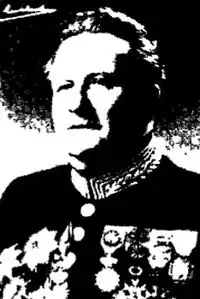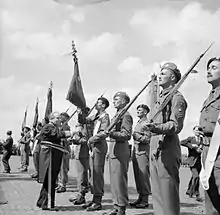Joseph Van De Meulebroeck
Baron Frédéric Joseph Vandemeulebroek (often spelled Van de Meulebroeck; 17 November 1876 in Laeken – 14 December 1958 in Brussels) was a Belgian Liberal politician and burgomaster of Brussels between 1939 and 1942 and again between 1944 and 1956.
Joseph Van de Meulebroeck | |
|---|---|
 Portrait of Van de Meulebroeck | |
| Burgomaster of Brussels | |
| In office 28 November 1939 – 13 February 1956 | |
| Preceded by | Adolphe Max |
| Succeeded by | Lucien Cooremans |
| Personal details | |
| Born | Frédéric Joseph Vandemeulebroek 17 November 1876 Laeken, Belgium |
| Died | 14 December 1958 (aged 82) Brussels, Belgium |
| Nationality | Belgian |
| Occupation | politician |
Personal life and family
Jef Vandemeulebroek was the son of Franciscus-Xaverius Vandemeulebroek, a travelling salesman, and Anna Maria Ludovica Bosmans. After receiving a degree in Medicine from the Free University of Brussels in 1901, he set up a practice in Laeken. On his death-bed in October 1958, he married his long-term companion Louisa Degueldre (1898–1985), with whom he had had a son, Jacques, who had been born in Ixelles in 1932.
Throughout his life, he encountered repeated problems with the accepted spelling of his name. Although his official name was "Vandemeulebroek", even many official papers dating to his period as Burgomaster are erroneously spelled "Van de Meulebroeck".
Political career
Vandemeulebroek became a communal councilor in 1907, and in 1912 became échevin of Public Instruction in Laeken. During World War I, he volunteered as a military doctor and served as part of the 6th Regiment of Artillery. When the commune of Laeken was annexed by the City of Brussels in 1921, he became a communal councilor in Brussels and, from 1930 until 1939, échevin of Public Works. As vice-president of the 1935 Brussels Exposition universelle, he continued his work promoting public works, and the Grand Palais du Centenaire and reordering of the Heysel Plateau date to this period.
From 17 November 1932 to 1936, he served as deputy for the Liberal Party for the region of Brussels. From 28 November 1939, he succeeded the late Adolphe Max as burgomaster of Brussels.
World War II

After the German occupation of Belgium in 1940, it became clear that Vandemeulebroek's patriotic stance would not be tolerated for long by the Germans. The pretext offered for his removal was an Amtsverbot order fixing an age limit of 60 on officials in public office; at the time, Vandemeulebroek was aged 65. Ironically, his designated successor, Jules Coelst, was six years older.
Even before his dismissal, however, he was arrested on 30 June 1941 and deported to Germany. He addressed the population in a "Proclamation" poster, which stated that "Contrary to what has been said, I have neither abandoned my post nor submitted my resignation. I am, I remain and I will remain the legitimate burgomaster of Brussels." Coelst did not remain in the position long, and on 24 September 1942, the City of Brussels was joined with its largely Flemish-speaking suburbs to form the new region of Groß-Brüssel ("Greater Brussels"), in which the Flamingant Jan Grauls was named burgomaster.
After the Liberation
When the city was liberated at the beginning of September 1944, Joseph Vandemeulebroek was reinstated as burgomaster. Returning to his office in the town hall, he opened the window and symbolically threw his cushion, sullied by the previous occupant, onto the Grand Place. He later received Winston Churchill, Dwight D. Eisenhower, Bernard Montgomery and Charles de Gaulle.
As a result of his declining health, Joseph Vandemeulebroek submitted his resignation of the position of Burgomaster which was accepted on 13 February 1956. He was succeeded by Lucien Cooremans. Vandemeulebroek was given the title of Baron by King Baudouin in 1953.
Further reading
- Cooremans, Lucien, Le Dr. Joseph Van de Meulebroeck fut créé baron en reconnaissance des services exceptionnels rendus au pays et à la capitale, in : De 1830 à 1958. Douze bourgmestres ont fait de Bruxelles une des plus prestigieuses capitales, s.l., s.n., s.d., s.p.
- Van Molle, P., Het Belgisch parlement 1894–1969, Gent, Erasmus, 1969, p. 335.
External links
- L'histoire des bourgmestres bruxellois – Joseph Van de Meulebroeck at Ville de Bruxelles
| Political offices | ||
|---|---|---|
| Preceded by Adolphe Max |
Mayor of Brussels 1939–1956 |
Succeeded by Lucien Cooremans |